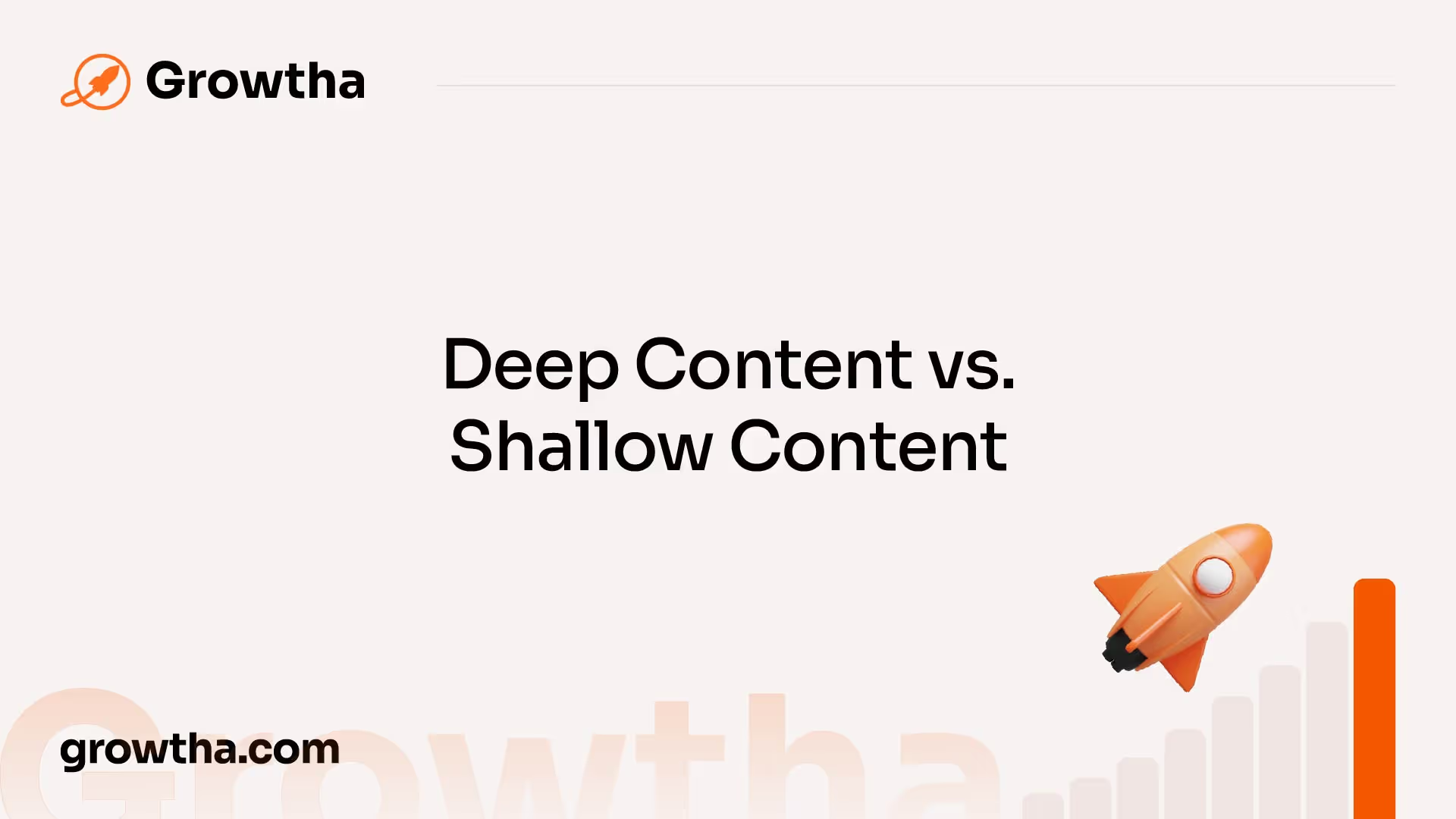How "Deep Content" Will Protect Your SEO in the AI Era
Content depth is an essential aspect of content marketing strategy for rapid search engine optimization gains.


How "Deep Content" Will Protect Your SEO in the AI Era
Understanding Content Depth in SEO

In the era of AI, safeguarding SEO requires a strategic approach to content creation. Content depth plays a crucial role in enhancing search engine optimization efforts. By delving into the importance of content depth and implementing effective strategies, businesses can establish themselves as authoritative sources and improve their SEO rankings.
Importance of Content Depth
Content depth is an essential aspect of content marketing strategy for rapid search engine optimization gains [1]. It involves creating comprehensive material that goes beyond surface-level information and addresses complex topics that cannot be easily answered by AI [2]. By providing detailed explanations, unique insights, and practical guidance, deep content establishes credibility and attracts organic traffic.
To dominate core topics and establish authority in a specific subject area, content depth should be the urgent priority in content marketing strategy [1]. It allows businesses to go beyond basic information and delve into more nuanced aspects of the topic. By providing valuable and comprehensive content, businesses can position themselves as trusted sources and build a loyal audience.
Search engines also consider the frequency of publishing about a specific topic and the recency of the content to determine relevance and authority [1]. Regularly creating in-depth content not only demonstrates expertise but also helps maintain the topical breadth required by search engines for higher rankings.
Strategies for Effective Content Depth
To ensure effective content depth, businesses should implement the following strategies:
- Clearly define content briefs: Clearly define the scope and depth of the content in content briefs. This helps writers understand the level of detail required and ensures consistency across the content.
- Focus on core topics: Prioritize dominating core topics before expanding to related subject matters. By establishing authority in a specific subject area, businesses can build a strong foundation for their SEO strategy.
- Research and analysis: Conduct thorough research and analysis to provide accurate and up-to-date information. This includes referencing reputable sources, conducting original research, and including relevant data and statistics.
- Address audience needs: Understand the needs and pain points of the target audience. Deep content should provide practical solutions, insights, and guidance that directly address these needs, offering value to the readers.
- Utilize various content formats: Deep content can take various forms, such as tutorials, case studies, original research, or in-depth analyses. Exploring different content formats allows businesses to cater to different learning preferences and engage a wider audience.
By implementing these strategies, businesses can create engaging and informative deep content that not only attracts organic traffic but also positions them as authoritative sources in their respective industries. Embracing content depth as part of an SEO strategy is crucial for safeguarding SEO in the AI era.
Leveraging Salience Score in SEO

In the realm of search engine optimization (SEO), understanding and leveraging the concept of salience score can have a significant impact on the effectiveness of your SEO efforts.
What is Salience Score?
Salience refers to the prominence or importance of a topic within a piece of content. Google's Salience Score is a numerical value assigned to an entity, reflecting its significance within a given document or content piece. This score is derived from Google's natural language processing (NLP) algorithms, which analyze the content to identify and evaluate the prominence of various topics and entities [3].
The Salience Score provides valuable insights into the topics and entities that resonate within a piece of information. It helps search engines understand the context and relevance of the content, thereby influencing its visibility in search results. By leveraging the Salience Score, website owners and content creators can optimize their content to align with Google's algorithms and improve their SEO performance.
Impact of Salience Score on SEO
The integration of the Salience Score into Google's algorithm represents a paradigm shift in SEO. It emphasizes the importance of creating content that genuinely addresses a topic and ensures that the most crucial entities are both present and prominent within the content [3]. This shift highlights the significance of producing deep, comprehensive content that provides genuine value to the audience.
By understanding and leveraging the Salience Score, website owners and content creators can optimize their content to align with Google's algorithms. This includes focusing on topics and entities that have higher salience within their content, ensuring that they are adequately covered and prominently featured. This approach helps search engines recognize the relevance and depth of the content, increasing its chances of ranking higher in search results.
The integration of Salience Score into SEO strategies signifies a shift in mindset. It urges businesses to create content that resonates at a deeper, more meaningful level, offering genuine value to their audience. By prioritizing the salience of topics and entities, businesses can set the foundation for lasting online success and establish themselves as authoritative sources within their respective industries.
Understanding and leveraging the Salience Score is just one aspect of safeguarding SEO in the AI era. To create an effective SEO strategy, businesses must also focus on other elements such as content depth, backlinks, engaging content, and the application of deep learning techniques. By combining these strategies, businesses can maximize their online visibility and stay ahead in the ever-evolving world of SEO.
Deep Content vs. Shallow Content

In the ever-evolving field of SEO, the concept of deep content has emerged as a powerful strategy to safeguard your SEO efforts in the AI era. Deep content refers to comprehensive material that delves into complex topics, providing detailed explanations, unique insights, and practical guidance that go beyond surface-level information. It is the antithesis of shallow content, which offers only superficial or basic information.
Differentiating Deep and Shallow Content
Deep content stands out from shallow content by its depth and substance. While shallow content may provide quick and easy answers, deep content tackles intricate subjects that cannot be easily addressed by AI. It goes beyond the basics, offering readers an in-depth understanding of a topic. Deep content often takes the form of tutorials, case studies, original research, or in-depth analyses, providing readers with valuable and comprehensive information.
On the other hand, shallow content tends to be brief, lacking the necessary depth to fully explore a subject. It may cover common or widely known information without providing any unique insights or value. Shallow content often fails to address complex queries or provide substantial solutions to users' problems.
Benefits of Deep Content
Deep content is considered the future of SEO, as it allows SEO professionals to create a robust strategy that can withstand the challenges posed by the rise of AI in search. By creating comprehensive content that goes beyond surface-level information, you can establish your expertise and authority in a particular area.
One of the key benefits of deep content is its ability to earn more backlinks. Backlinks remain a crucial ranking factor in SEO, and creating content that showcases unique experiences, expertise, and data can help in earning backlinks. Deep topics offer more depth and substance for others to reference and link to, making them more likely to attract backlinks compared to shallow topics.
Moreover, deep content is interesting and engaging, aligning with what both Google and readers expect from content. Google values originality and engaging content, which can potentially lead to higher rankings. Additionally, user signals like click-through rate indirectly influence Google's algorithms, emphasizing the importance of creating engaging content. By developing deep content that captivates readers, you can improve user signals and potentially boost your SEO performance.
In summary, deep content provides a unique opportunity to establish authority, earn backlinks, and engage readers. By going beyond shallow information and exploring complex topics, you can create a strong SEO strategy that aligns with the demands of the AI era. Invest in the creation of deep content to safeguard your SEO efforts and position yourself for success in the evolving landscape of search engine optimization.
Backlinks and Deep Content

In the ever-evolving landscape of SEO, backlinks remain a crucial ranking factor. Backlinks are external links from other websites that point to your content. They act as a vote of confidence, indicating to search engines that your content is valuable and authoritative. When it comes to deep content, backlinks play a significant role in safeguarding your SEO efforts.
Role of Backlinks in SEO
Backlinks have long been recognized as an essential element in SEO. They serve as a signal to search engines that your content is reputable and relevant. The more high-quality backlinks you have pointing to your deep content, the more likely it is to rank well in search results.
Backlinks are like endorsements from other websites, vouching for the quality and value of your content. Search engines consider these endorsements when determining the credibility and authority of a webpage. With a strong backlink profile, your deep content is more likely to gain visibility and attract organic traffic.
Attracting Backlinks with Deep Content
Deep content, rich in unique experiences, expertise, and data, is more likely to attract backlinks from reputable sites. This is because there is more depth and substance to reference and link to. When you create comprehensive material that provides detailed explanations, unique insights, and practical guidance, other websites are more inclined to link to your content as a valuable resource.
To attract backlinks to your deep content, consider the following strategies:
- Create valuable and unique content: Develop deep content that offers fresh perspectives, original research, case studies, or in-depth analyses. This unique content is more likely to capture the attention of other website owners and bloggers, increasing the chances of them linking to your content.
- Promote your content: Actively promote your deep content through various channels, such as social media, email newsletters, and industry forums. By increasing its visibility, you enhance the likelihood of other website owners discovering and linking to your valuable resources.
- Build relationships: Engage with influencers, industry experts, and other content creators in your niche. Building relationships can lead to opportunities for collaboration and guest posting, which can generate valuable backlinks to your deep content.
- Reach out for partnerships: Identify websites or organizations that may find value in your deep content. Reach out to them and propose collaborations, such as co-creating content or contributing guest posts. These partnerships can result in backlinks and increased visibility for your deep content.
Remember, while attracting backlinks is important, the quality of the backlinks matters just as much as the quantity. Focus on acquiring backlinks from authoritative websites that are relevant to your industry or niche. These high-quality backlinks will have a more significant impact on your SEO efforts.
By prioritizing deep content and actively seeking backlinks, you can strengthen your SEO strategies in the AI era. Deep content attracts backlinks, enhances your authority, and helps safeguard your SEO efforts by providing valuable resources that AI may struggle to replicate.
Creating Engaging Deep Content

When it comes to safeguarding your SEO in the AI era, creating engaging deep content is key. Engaging content not only captures the attention of your audience but also provides value and keeps them coming back for more. Let's explore the importance of engaging content and strategies for creating it.
Importance of Engaging Content
Engaging content is interesting because it offers "information gain" - bringing something new, original, and valuable to the table. This originality is highly valued by search engines like Google, and they have mechanisms in place to identify and potentially reward it [2]. By creating engaging content, you can improve user signals, indirectly influencing Google's algorithms and positively impacting your ability to rank.
When your content is engaging, it captures the attention of your audience and encourages them to spend more time on your website. This increased dwell time can send positive signals to search engines, indicating that your content is valuable and relevant. Engaging content can also lead to better user signals such as click-through rate and reduced bounce rate, which further reinforces the importance of creating content that captivates your audience.
Strategies for Creating Engaging Deep Content
To create engaging deep content, consider the following strategies:
- Identify your target audience: Understand the needs, interests, and pain points of your target audience. This will help you tailor your content to their specific needs and create content that resonates with them.
- Choose deep topics: Deep topics are more interesting and engaging because they delve into a subject matter in-depth. Research and explore topics that are relevant to your audience and provide valuable insights and information.
- Tell compelling stories: Engage your audience by weaving compelling stories into your content. Stories have the power to captivate and evoke emotions, making your content memorable and shareable.
- Provide practical tips and advice: Share actionable tips and advice that your audience can implement in their own lives. Practical content that helps solve problems or provides useful information is highly valuable to readers.
- Use visuals effectively: Incorporate visuals such as images, infographics, and videos to enhance the engagement of your content. Visuals can help break up text, make complex concepts easier to understand, and increase the overall appeal of your content.
- Encourage interaction: Foster engagement by encouraging your audience to interact with your content. Include calls-to-action, ask questions, and invite comments and discussions. Respond to comments and engage with your audience to create a sense of community.
By implementing these strategies, you can create engaging deep content that not only attracts and retains your audience but also improves your SEO performance in the AI era. Remember, Google values originality and engaging content, and user signals play a crucial role in search engine rankings. So, invest in creating content that offers value, engages your audience, and keeps them coming back for more.
Deep Learning in SEO
As the AI era unfolds, deep learning (DL) is emerging as a powerful tool in the field of search engine optimization (SEO). DL revolutionizes evidence-based decision-making techniques by utilizing multiple layers of non-linear feature transformation to overcome limitations posed by large datasets [6].
Application of Deep Learning in SEO
DL allows computational models to gradually extract higher-level features from raw input, enabling computers to learn complex concepts by forming them out of simple ones [6]. In the context of SEO, DL techniques can be applied to various aspects of the optimization process, including:
- Keyword Analysis: DL-based natural language processing (NLP) models can enhance keyword analysis by understanding the context and intent behind search queries. This enables marketers to optimize their content for relevant keywords, improving search engine rankings.
- Content Generation and Optimization: DL models can generate high-quality and engaging content, taking into account user preferences and search engine requirements. By leveraging DL, marketers can create optimized content that resonates with both users and search engines.
- Image and Video Optimization: DL algorithms can analyze images and videos to extract meaningful information. This allows for better optimization of multimedia content, improving search visibility and user engagement.
- User Experience Analysis: DL techniques can be employed to analyze user behavior and preferences, providing insights into website usability, navigation patterns, and content consumption. By understanding user experience, marketers can optimize their websites to enhance user satisfaction and improve SEO performance.
Advantages of Deep Learning in SEO
The application of DL in SEO offers several advantages, including:
- Enhanced Accuracy: DL models can process vast amounts of data and extract intricate patterns, leading to more accurate and precise optimization strategies. This enables marketers to make data-driven decisions and achieve better SEO results.
- Improved Efficiency: DL techniques automate various SEO processes, reducing manual effort and saving time. By automating tasks such as keyword analysis, content generation, and performance tracking, marketers can focus on strategic initiatives.
- Adaptability to Algorithm Updates: DL models can adapt to changing search engine algorithms and ranking factors. This flexibility allows marketers to stay ahead of evolving SEO trends and ensure their strategies align with current best practices.
- Personalization: DL algorithms can personalize search results based on user preferences, search history, and behavior. This enhances the user experience by providing tailored content and recommendations, leading to higher engagement and improved SEO performance.
By harnessing the power of DL in SEO, marketers can gain a competitive edge in the AI era. However, it's important to stay updated with the latest developments in DL and adapt strategies accordingly to maximize the benefits it offers.
References
[1]: https://topicseed.com/blog/content-depth-for-seo/
[2]: https://web.swipeinsight.app/posts/how-deep-content-will-protect-your-seo-in-the-ai-era-3660
[3]: https://www.601media.com/leverage-google-salience-score-for-seo-optimization/
[4]: https://ahrefs.com/blog/seo-ai-deep-content/
[5]: https://me.linkedin.com/posts/filipe-santos-seo_trust-machines-building-a-decentralized-activity-7029145869388017664-ma7y
[6]: https://link.springer.com/article/10.1007/s10462-023-10466-8







